Reviews
Gojira tai Kingu Gidora
Kazuki Omori
Japan, 1991
Credits
Review by David Carter
Posted on 18 February 2013
Source DVD
Categories The Compleat Godzilla
The primary metaphor in the Godzilla franchise is an obvious one: Godzilla was intended to be representative both of the atomic horrors of Hiroshima and Nagasaki and Japan’s uneasy relationship with atomic energy for the remainder of the twentieth century. Initial entries in the series dealt with these issues head on through reliving them. But the Showa series eventually drifted into parody of these events as Godzilla became Japan’s erstwhile protector from foes worse than himself, tempering terror with comedy. The success of the franchise implies that some measure of catharsis was achieved, yet it would not be until 1991’s Godzilla vs. King Ghidorah that the series explicitly addressed the cause of the trauma it had been dealing with for decades: America.
Americans are the villains of Godzilla vs. King Ghidorah. The film’s time travel plot involves Americans from a Japan-dominated future traveling to the past to stop the creation of the nation’s protector, Godzilla. The second part of their plan involves destroying Japan by unleashing King Ghidorah, forcing the modern-day Japanese to face the harsh reality that they need Godzilla and must recreate him.
Godzilla vs. King Ghidorah was the first film in the series to offer up a definitive origin of Godzilla and, in doing so, begins its increasingly overt attacks on America. Beginning life as a dinosaur on a Pacific island, Godzilla saved a garrison of Japanese troops from the Americans before being transformed to his more recognizable form by atomic tests on the Bikini Atoll. By invoking World War II and American atomic tests, America is cast in the role of being Japan’s villain in the past, present, and future. The revised origin of King Ghidorah - formerly from outer space, he’s now an American weapon of mass destruction - further drives home American villainy by associating the nation with Godzilla’s greatest foe.
Indeed, if one watches the Godzilla series with a critical eye, America is the specter looming just outside the frame. America was responsible for Japan’s destruction and was deeply ingrained in their efforts to rebuild even after the end of the seven-year occupation. Godzilla is therefore a metaphor for America: a giant, destructive force, but one that the Japanese acknowledge is necessary for their continued existence. Godzilla vs. King Ghidorah is the first film in the series where this idea is the primary concept at work in the narrative. The film sees Japan besieged by America again and forced to rely on Godzilla, the series’ America-by-proxy threat, to save themselves.
The film’s climax reveals much about the Japanese attitudes toward America and its role in their past and future. A reborn Godzilla easily defeats King Ghidorah but immediately resumes terrorizing Japanese cities. To stop him, Mecha-King Ghidorah is brought from the future and battles Godzilla to a stalemate, ultimately sacrificing himself to submerge Godzilla at the bottom of the ocean. The film’s fatalistic message is clear: once the cycle of destruction begins, there will be no end. Several Godzilla films feature a similar message, but it is only here that the party responsible for introducing the destruction is pulled into the spotlight.
More The Compleat Godzilla
-
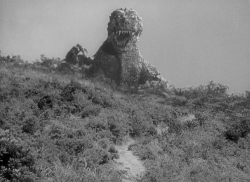
Godzilla
1954 -
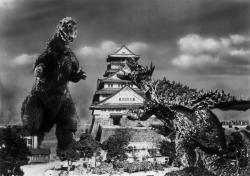
Godzilla Raids Again
1955 -
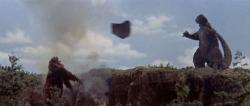
King Kong vs. Godzilla
1962 -
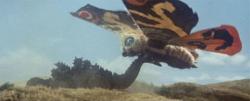
Mothra vs. Godzilla
1964 -
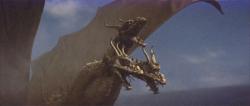
Ghidorah, the Three-Headed Monster
1964 -
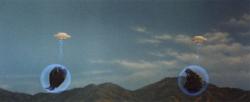
Invasion of Astro-Monster
1965 -

Ebirah, Horror of the Deep
1966 -
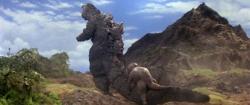
Son of Godzilla
1967 -
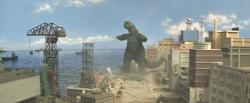
Destroy All Monsters!
1968 -
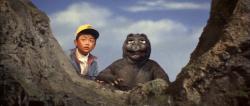
All Monsters Attack
1969 -
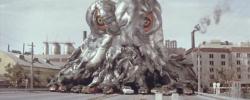
Godzilla Vs. Hedorah
1971 -
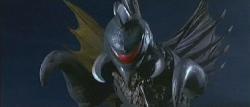
Godzilla vs. Gigan
1972 -
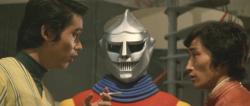
Godzilla vs. Megalon
1973 -
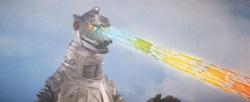
Godzilla vs. Mechagodzilla
1974 -
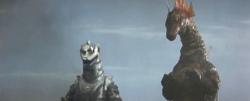
Terror of Mechagodzilla
1975 -
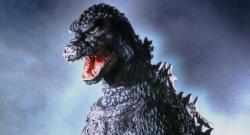
The Return of Godzilla
1984 -
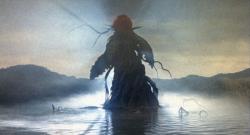
Godzilla vs. Biollante
1989 -
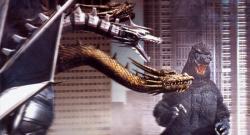
Godzilla vs. King Ghidorah
1991 -
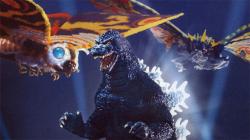
Godzilla vs. Mothra
1992 -
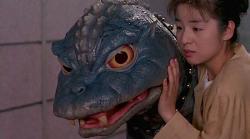
Godzilla vs. Mechagodzilla
1993 -
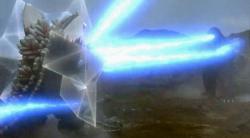
Godzilla vs. SpaceGodzilla
1994 -
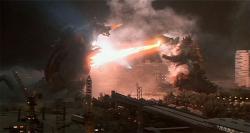
Godzilla vs. Destoroyah
1995 -
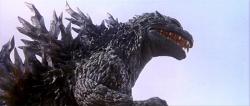
Godzilla 2000
1999 -
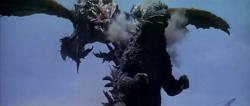
Godzilla vs. Megaguirus
2000 -
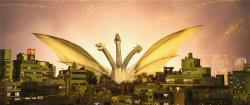
Godzilla, Mothra and King Ghidorah: Giant Monsters All-Out Attack
2001 -
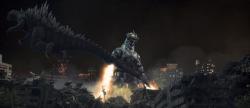
Godzilla Against Mechagodzilla
2002 -
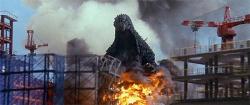
Godzilla: Tokyo S.O.S.
2003 -

Godzilla: Final Wars
2004
We don’t do comments anymore, but you may contact us here or find us on Twitter or Facebook.



